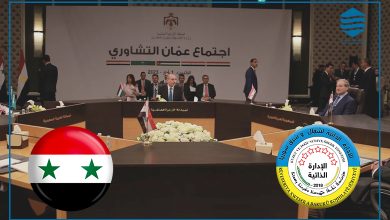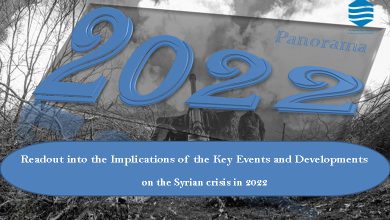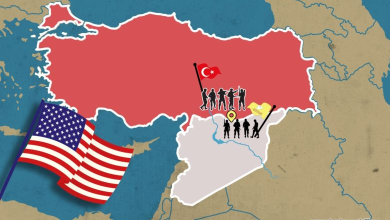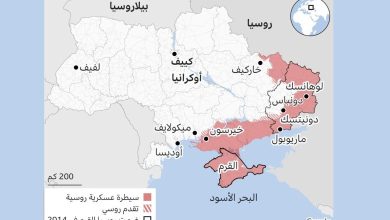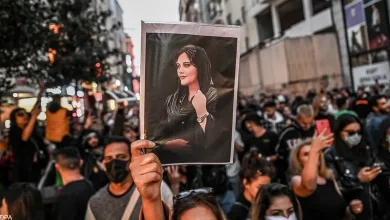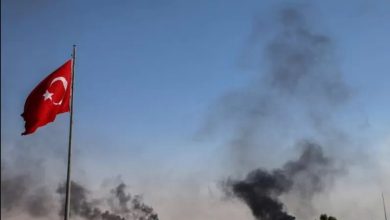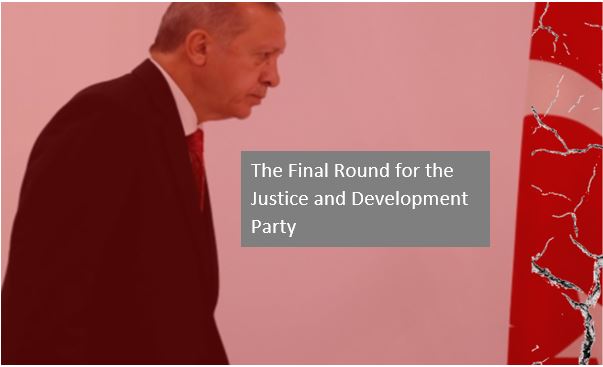
The Final Round for the Justice and Development Party
Also Available in (Arabic) and (Kurdish)
Al-Furat Center for Studies- Translation Department
Introduction
In light of discussions about holding early general elections among the Turkish opposition, in November of this year, the current situation in Turkey under the leadership of the Justice and Development Party abbreviated in Turkish as (AKP), whether at the level of domestic or foreign policy, does not tip the balance in favor of the opposition’s demands, and it seems that the elections will be held as scheduled in June 2023.
Opinion polls, which measure public opinion, indicate a decline in support for the (AKP) Party and a decline in its chances of obtaining votes in the upcoming general elections.
In this regard, we can ask the following questions: What does the next phase hide for the (AKP) government? Will international circumstances allow the continuation of the ruling party’s government in Turkey? What are the challenges and potential scenarios that this government will face?
Turkey was founded on the ruins of the Ottoman Empire, in the early 20th century. In order to keep pace with the times, it adopted a secular, civil constitution and the republican and parliamentary system in the state’s political system. It also practiced the policy of neutrality in many important junctures in its foreign policy. Thus, the prevailing republican regime in the aftermath of the rule of “Mustafa Ataturk” and his companions in the Republican People’s Party continued until the end of the 20th century.
Despite the succession of governments, no one dared to change the basic principles on which the state was founded. Everyone who tried to bring about any change in the state’s structure was either imprisoned, for instance, the imprisonment and execution of Adnan Menderes[1], or assassinated like “Turgut Ozal” [2], who tried to open up to the world order on the one hand, and to change the shape of the state from a national state that denies the various identities in Turkey – by solving the Kurdish issue and the rest of the ethnicities – to a patriotic state that brings together all discrepancies, and then the AKP government flipped on the basic principles of the republic, which adopted political Islam as a new module for the state.
Justice and Development Party Historically
The laws and constitution of the “civil-secular” state fought relentlessly against the relics and remnants of the Ottoman Empire, which created a reaction among the clergy and the Islamic grass roots in Turkey. Subsequently, resulted in organizing of this sector into political parties, which pursue the Islamic religion as the party’s ideology, or what is called “political Islam”. These parties have – for a long time – opposed and struggled over the authority of the state.
The signs of the formation of these organizations appeared in the military coup of September 12, 1980, in which the Islamic “Welfare Party” was founded in 1983, when the military government allowed the formation of parties, at the time, the party formed a coalition government (1996-1997) led by the party’s president, Necmettin Erbakan.
Although religious parties are not part of the culture of the secular state, which was founded by Mustafa Kemal Ataturk, however, these parties have a cultural legacy of religious heritage – not to be underestimated – by virtue of the Islamic background of the state and society, which offered to these parties with a large mass grass-roots, especially since the peoples are not Arabic-speaking people are influenced by the Islamic religion more than the others, and it is easy to organize them into religious groups and parties.
In light of these developments, which were characterized by the escalation of tension and friction between the Islamists and the secular regime, the Justice and Development Party was founded, which in turn split from the mother party “Rafah” (the Welfare Party, which changed its name to the “Virtue” party that was banned at the time, in 2001). The AKP party introduced itself as a more effective alternative compared to the rest of the religious parties.
The assigned tasks to the “Justice and Development Party” by the dominant forces in the world order
The AKP party was entrusted with several tasks, after it had introduced itself as an alternative, such as ensuring that the Turkish state – which has been shrinking for a long time – would be more open to the global system on the one hand, and the possibility of combining political or “moderate” Islam with the laws of the secular state, in addition to solving problems and domestic Turkish issues, on the other hand.
Therefore, in order to implement what it proposed – he began to work on solving the domestic issues first, which have been burdening the Turkish state for a long time, especially the Kurdish cause, this issue saw, after incomplete attempts were made by Turgut Ozal, unprecedented openness, and witnessed promotion not to be underestimated by the media, and discussed in the Turkish political setting; discussing the Kurdish issue created a rift in the unilateral chauvinist and racist mentality and that completely rejects peoples’ issues. This openness, and the opportunity for peace talks proposed by Mr. Abdullah Ocalan, played a role in making the AKP Party one of the most powerful parties, in which it could form a government on its own, Without the need for other parties, therefore, what is understood from the changes made by the AKP party at the beginning of its emergence, as a set of tasks entrusted to it internally, which in turn plays a major role in carrying out the tasks entrusted to it externally.
Externally, since the formation of the AKP government, one of the tasks entrusted to it was putting forward a policy of “zero problems” with neighboring countries. In the Middle East, extremist Islamic tendencies began to organize itself more than ever before, and it was necessary to curb these tendencies, which began to threaten the interests of the dominant powers, and from the principle of “Diamond cut Diamond”, they worked on founding such parties i.e. the AKP party to carry out this task, as more moderate Islamic parties on the one hand, especially since the West has a prejudgments; they see that the East is a homogeneous mass of the Islamic religion, Religion has great effects on the region. Therefore, they paid great attention to more “moderate” Islamic parties and tendencies, and the task of this party was to open up to neighboring countries, to attract them and relate them to the superpowers that dominate the world order, on the other hand. Aiming at making room for them, and to intervene easily and smoothly in any part of the region, due to the fact that the formation of shrinking nation states within their narrow borders in the region – following the collapse of the Ottoman Empire – according to the “Sykes-Picot Agreement”, which do not give an opportunity for foreign investments within their borders, and it does not give an opportunity for the flow of foreign capital, in addition to the chauvinistic nationalist extremism nature of these countries. This is clear throughout the foreign diplomatic moves of the ruling party in Turkey that one of its foreign tasks is to harness Shiite nationalism in Iran, and Arab chauvinistic nationalist extremism in Arab countries. The relations that crossed the boundaries of diplomatic relations between the government of Bashar al-Assad and Erdogan and the conclusion of the “Adana Agreement” in 1998, are only part of this attempt to open up, in addition to the attempt to establish relations with Iraq, Greece, Cyprus and the Arabian Gulf was based on the principle of a policy of “Zero problems”
Conditions of the AKP party to carry out the tasks entrusted to it
The AKP party demanded to double its share, in exchange for serving that hegemony. The way to accomplish this is to reduce the army’s guardianship over it, prevent the mounting of new coups against it, and double its share of the gains from exploiting the East by harnessing Iranian Shiite nationalism, Arab radical Islamism, and Arab secular nationalism.
The process of “Justice and Development” Party since taking power and the changes it has experienced
The AKP party began its political career in Turkey as a movement in opposition to the ruling regime at the time and was able, in a short period, to form its government, throughout parliamentary elections, in 2002, when it won the majority of votes, but this success had several reasons.
The AKP’s electoral program played a major role, as it promised in its election campaigns to solve many issues that have become a burden on the peoples in Turkey, and one of these major issues was the Kurdish issue. “The Kurdish cause is my cause, and it must be resolved.” Erdogan said in his speech to the people in the Kurdish (Amed) Diyarbakir city. This was the first public speech since the emergence of the modern Turkish state, and therefore the Kurds, whose voices cannot be underestimated, thought that Erdogan’s speech could be a good gesture to resolve their issue. Thus, he won many Kurdish votes in favor of his party and lured them toward him.
In addition, he was able to find solutions to get the people out of the crucible of poverty that has afflicted them since the foundation of the republic, as the Turkish people had hoped for an economic policy more open to the world, to improve individual’s income, and this was a significant part of the AKP’s electoral program.
Likewise, he promised to maintain on the secularism of the state and its institutions. In other words, he tried to introduce his program based on creating a combination of the secularity of the state and the Islamic nature of the ruling party, in addition to his promise to improve relations with neighboring countries, based on the principle of a “zero problems” policy.
The “AKP” government followed this approach roughly until 2011, when it took advantage from the “peace talks” phase launched by Mr. Ocalan, which was interspersed with the ceasefire phases, which created a suitable atmosphere to activate foreign investments inside Turkey. Indeed, the people lived a period of luxury, in addition to the gains that had been achieved on the tourism sector level, as a result of the semi-stability that Turkey experienced in that era.
Moreover, it has made a significant change in the mindset of the fanatical Turks. In other words, the discussion of issues of non-Turkish ethnicities and peoples, which were subjected to the policy of Turkification in Turkey, has become smoother, compared to the period before Erdogan’s era, in addition to allowing non-Turkish peoples to announce their identity and practice their culture, for instance, the act of speaking of the Kurdish language has no longer deemed as an act of offense that would end up the speaker being imprisoned. Therefore, the changes that took place in Turkey, from improving livelihood conditions and granting some kind of freedoms, led to an increase in the popularity of the “AKP” and to successive wins of elections. However, the protest movements in the Middle East in the name of the “Arab Spring” made Turkish President Erdogan to salivate, and revealed the real “other face” of him, as he completely changed his axis – whether in his domestic or foreign policy – and showed his ambitions to transform Turkey into a global power, which would compete with the superpowers.
The changes that have occurred in the policy of the “Justice and Development” government internally
The AKP party tried to implement the tasks entrusted to it at the beginning of its rule, but it failed and began to change and deviate the direction of its policy. The foreign policy during Erdogan’s era, which was proceeding according to the principle of “zero problems”, turned – later – into “zero friends.”, and then to a global problem, because of his relations and support for global terrorism. In addition to practicing the policy of “a double standards” with countries that have contradictory interests, such as (Russia and Ukraine; Israel and Iran; “NATO” and its enemies, the Gulf states, and Iran…etc.).
The scenarios that the “AKP” government is likely to face
It is noticeable that there are new arrangements and alliances, whether at the global or regional level, and it seems that Turkey’s role is not clear in the midst of these developments. Turkey is probably experiencing an international isolation, especially by the European countries, America, and Israel, because of its suspicious relations with the “enemies of those countries.” Therefore, Turkey has recently been trying to restore of its relations with these countries. However, there is no serious openness to those relations from what is obvious from those countries’ stances, in which the Ukraine war put Turkey at a crossroads.
In addition, Turkey’s role is very limited in the upcoming changes, developments, and alliances, or rather, Turkey is absent from it, and this is what disturbs it; All of Turkey’s attempts aiming at being an important part of the change project that began in Iraq in 2003, alongside the events of the “Arab Spring”, which aroused its enthusiasm, and started its own projects, away from taking into account the interests of the world’s dominant powers, which is the “Neo-Ottomanism” project by land. In addition, the “Blue Homeland” project [3] by sea. Considering that the “Lausanne Agreement” has approached its centenary, Turkey aspires to reformulate it and hopes to conclude a new global agreement on the ruins of the “Lausanne Agreement”, which it considers undermining its interests, and it wants to consolidate its existence, via this “new agreement” that it aspires to, in the geography it entered under the pretext of fighting “terrorism”, as it built its bases in Bashiqa, adjacent to the borders of Mosul in Iraq, as well as to carve out lands from the Syrian map, and to put pressure on Greece, to expand its maritime borders by its intervention in Libya. However, it is obvious that the winds moves against Turkey’s ship; it is not part of the projects the consolidation of American influence in the region until this very moment, and the American interest in Greece arouses its ire. Recently, America has built more than 11 new military bases in Greece, These bases were provided by military armored vehicles, which aroused Turkey’s ire and questions about America’s objectives in building these bases, but what made Turkish President Erdogan upset was the receiving of the Greek Prime Minister, Kyriakos Mitsotakis, in the US Congress, where “Mitsotakis” complained to Congress about Turkey’s movements and abuses in Greek territorial waters, at a time when Erdogan has not been able to cross the doorstep of the White House since Joe Biden took over the US presidency. Erdogan has been speaking of a new military operation in northern Syria recently. It was an attempt to put pressure on the American side aiming at meeting Biden, who paid no attention to Erdogan’s government. At the same time, the Turkey’s pressure cards against America are almost non-existent, and it is clear that Erdogan has entered the phase of a “concessions policy”, which began with a zero-problems strategy, which led to zero pressure cards, especially with the West, such as abandoning the veto against the tow Nordic countries and accepting Finland and Sweden’s accession to NATO, without achieving its goals, as well as the concession to Saudi Arabia was clear and humiliating in the visit of Saudi Crown Prince Mohammed bin Salman to Turkey, and so on.
The First Scenario
The inability of the ruling party in Turkey to form a government, if the general elections were held in 2023, and this means its fall via the elections, and in this atmosphere that everyone discusses about the post-AKP government, it is expected that there would be no formation of a new government to succeed the current government, given that Erdogan has preparations may impede the smooth transition of power; he has built an army of extremists (the Muslim Brotherhood, Al-Qaeda, Turkish Hezbollah, ISIS..) who will work to create chaos and destabilize Turkey, in case of the defeat of the AKP party in the upcoming elections, meaning that the scenarios that occurred in each of the Syria, Iraq and Afghanistan, will be repeated in Turkey as well, and the project of dividing Turkey will be strongly present, and it is expected that the American-Greek preparations, from arming the islands and strengthening their influence during the construction of military bases, is to face any change that may occur in Turkey. In other words, building a greater Greece at the expense of Turkey, and getting back its territories from Turkey, is more important to the West and America than current Turkey, which hinders plans and projects of whether NATO or America, in addition to blackmailing Europe every now and then.
The Second Scenario
This scenario is related to the Kurdish issue, in which Erdogan is likely to try to restore the peace talks phase and open the door for dialogue with Mr. Ocalan, because Erdogan’s government is fully aware that its salvation and continuity are linked to the voices of the Kurds, and this is promoted by writers close to Erdogan, but this attempt has various possibilities including:
- An unfaithful rapprochement to the Kurdish issue and exploiting it until the end of the elections, in order to win their votes (the Kurdish votes), but it is likely that Mr. Ocalan will not give Erdogan this opportunity again, as he did not benefit from previous attempts of peace talks.
- It is possible that Erdogan will act seriously on resolving these issues, including the Kurdish issue, but the world’s dominant powers will most likely work to put obstacles in front of this step. It is obvious that these forces have decided to put an end to Erdogan, and they will not allow him to get rid from his isolation. These obstacles, for the first time, will not be against the Kurds rather, it would be against at the Turkish government, which has changed its course and axis from the interests of the world powers. In addition, resolving this issue will provide Erdogan’s government with the lifeline, and this is what the dominant powers do not want to.
The Third Scenario
Due to the practice of the “edge of the abyss” policy by Erdogan, he likely will postpone or cancel the general elections and will remain threatened with coups, and this is one of the dangerous scenarios in front of Erdogan’s future.
The Conclusion
The AKP party’s Turkey is facing scenarios, the best of which is bitter, and no matter how different these scenarios are, Turkey after 2023 will not be the same as it was, in which the deteriorating economic situation also portends dangerous conditions for this government, because peoples who are addicted to luxury are more dangerous than peoples who are not accustomed to it, and the Turkish people began to lose the means of luxury one by one.
[1] Adnan Menderes is the first elected democratic political leader in Turkey, the founder of the Democratic Party, and the last Turkish political leader to be executed after the military coup that took place in Turkey in 1960.
[2] The eighth president of Turkey, where he held its presidency from 1989 until the date of his death in 1993.
[3] This term means the domination of the exclusive economic zone, the adjacent territorial waters, and the continental shelf, i.e. the eastern Mediterranean, the Black Sea, and the Aegean Sea, which allows it to use all marine resources more freely. Retired Admiral Cim Gurdeniz, the first to use the term of “blue homeland”, was head of the unit that is in charge of Turkey’s maritime plans and policies in 2006.
